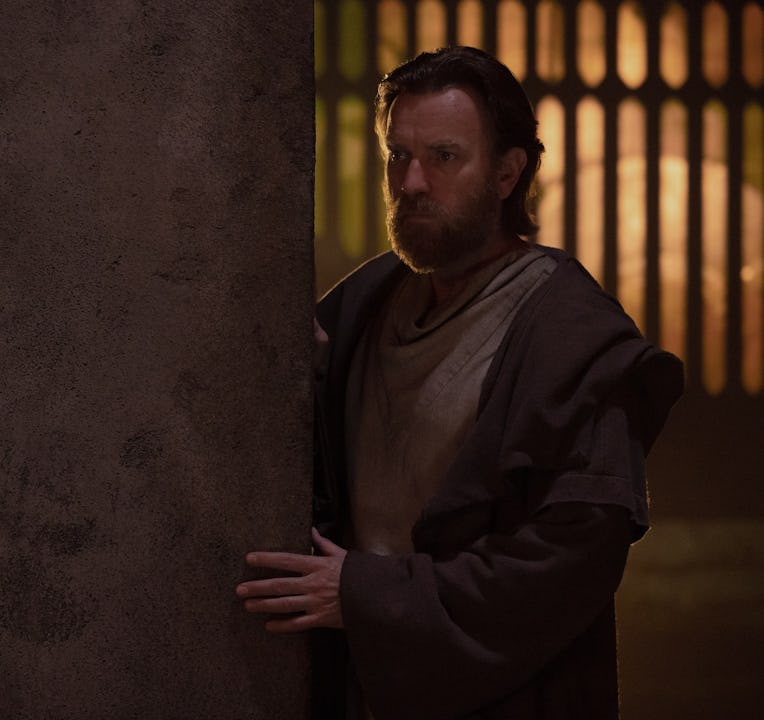Continuity, canon, and lore have clashed as of late, and a tense atmosphere of defensiveness within and between fandoms is manufacturing dire, hyperbolic crises about properties that shouldn’t matter so much. The release of the new Disney Plus series Obi-Wan Kenobi and its apparent looseness with the established Star Wars canon provoked a debate at the series-spanning macro level, but people also love to argue about the small stuff. Cigarettes of differing lengths between shots, glasses fuller or emptier within the same scene, this guy with a briefcase running past Doctor Strange multiple times, or this woman repeatedly walking into the background of a shot in Spider-Man. All kinds of art criticism, but primarily film and TV criticism, has become the domain of smartasses on YouTube who are quick to argue why a given thing is or isn’t good based on how many times you can spot the same extra in the background. Why does anyone give a shit?
We can start in an obvious place: CinemaSins, the popular YouTube channel that tallies up a given movie’s flaws and rates them accordingly, often with special attention paid to continuity errors and other background errors. Often, the channel rags on bad movies no one would spend much time defending, like 50 Shades of Grey or Roland Emmerich’s 2012, and does so with self-effacing humor. And, after enough time spent watching these videos, which draw attention to some interesting mistakes (the rampant use of dialogue to describe things that should have been shown onscreen, bad camera blocking, lazy character development, unnecessary exposition, etc), you start to see similar errors in other things, in everything, from minor distractions to larger storytelling issues.
A little dose of observational awareness is one thing, but ten years in, CinemaSins has made a score-keeping style of understanding art mainstream. If plot beats and long silent moments between characters or odd, idiosyncratic flourishes of style and time-consuming conversations don’t add up, what’s the point of a movie? It’s less that these are invalid criticisms and more that, applied blindly and universally, they reduce a movie or show to a self-referential machine that must work to justify its own existence with each scene, every element functioning logically and efficiently. Whether or not CinemaSins can be held significantly responsible for what amounts to an internet-wide habit of self-satisfied nitpicking, it is a lodestar for the kind of “gotcha” punditry that passes for legitimate criticism.
When you open that conversation wider to include canon and lore, the same characteristics and simplistic failures follow, but with far larger argumentative consequences. Take your pick of any fandom: Star Trek, Doctor Who, Supernatural, Avatar, Lord of the Rings. All of these properties have fielded internal conflicts over the consistency and intricacy of their respective narratives, with wikis dutifully edited and re-edited, forums lit with debate in order to make clearer distinctions between one season directed by this person versus another written by that person, this character played by one actor and that same character later played by someone else, this scene in the adaptation versus this scene in the source material. People devote their lives to the tangle and obsession of fandom, which can then make the prospect of criticizing their behavior harder or easier, depending on how much sympathy you have for them. But slavish scrutiny to details doesn’t make for a good story and being an asshole doesn’t grant you unchecked authority.
The week Obi-Wan Kenobi premiered on Disney Plus, there was a swift one-two punch of controversy within the fandom. First, there was the continuation of narrative-level retconning, particularly as it pertained to iconic characters who had or hadn’t met, were alive when they should be dead, named when they previously weren’t. Frankly, I stopped caring about Star Wars after the hallucinatory Rise of Skywalker, one of the worst movies I’ve ever seen, annihilated half my brain. So I’m biased and also haven’t watched the new show. But I didn’t need to, because fealty to the source material often doesn't have any bearing on the adapted product. “Is this good?” and “Is this correct according to my standards?” are two different questions, and we should care only about the first one.
New York Times columnist Jamelle Bouie tweeted sagely about Star Wars continuity, but the sentiment applies to any serial work: “The important thing is to do what's right for the characters and the story, if that means thinks are a little inconsistent, who cares. This belief that everything in a movie must be cohesive and consistent — that everything must have an explanation and a purpose — is bad.” At a certain point, the most ardent and protective of fans have to ask themselves if it’s worthwhile to be jaded and perpetually upset by change, if the thing that matters so much to them is really the perfect, crystalline jewel they think it is or something that was made, released, and briefly enjoyed. The nitpickers showcase a fastidious attention to the least important details, stripping something down to its constituent parts, the elemental mistaken for the fundamental. It’s a “forest for the trees” situation, I suppose. Director David Fincher puts it better. “There are people who watch movies and make a list of all the continuity errors. I fear those people and I weep for them.”
Nicholas Russell is a writer from Las Vegas. His work has been featured in The Believer, Defector, Reverse Shot, Vulture, The Guardian, NPR Music, and The Point, among other publications.
